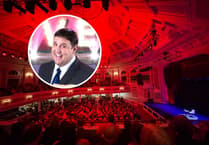The following is a letter published in the Isle of Man Examiner. To submit your own [email protected].
What is the future of the TT? I ask this in the light of the fact only two newcomers in the solo classes have come to TT 2025.
The sidecars have more newcomers, and the TT can attract crews from world championship level.
Has the TT become so elitist for the solo class that only two riders are considered to be able to join the ranks of the established competitors? Has the TT in fact become a closed shop?
No criticism on the fact that the TT has evolved and the spectacle and speed displayed by the brave men and women who take on the Mountain Course is remarkable, awe inspiring, and as an event is the greatest motorsport spectacle in the world. I question however where are the future Isle of Man TT stars going to come from? The traditional route was to draw in riders from the Manx Grand Prix.
The facts speak for themselves on this policy as 26 riders through the years who have won a Manx Grand Prix have gone on to win a TT. The Present TT presents a show like no other with a high standard of competitors who have to achieve a mountain course licence prior to the event each year and a high qualification speed to race in the event. The number of starters in each event has been limited. But the present crop of racers is not going to be around forever, so how to replace them with up-and-coming riders?
Certainly, the policy of cherry-picking riders from the British Superbike paddock and World Endurance Racing has not produced the numbers of new riders to the TT to replace the established stars when they hang up in light of the fact, so few new riders are competing a little short sighted in the bigger picture of the future of the event.
As well as the newcomers issue, surely it is time to face the fit in 10 races into the programme does not work. I know the weather was the problem during the race and practice week, but trying to run 40 events is an impossible task. 14 racing laps did not take place in the 2025 TT, only one race ran on to the programmed schedule. Less races would allow more flexibility to run races to the full programmed distances. Nobody wants one lap and two lap races. In the present format the organisers are making a difficult task more difficult and impossible to deliver what is promised in the programme the written one bore no resemblance to the reality, less races, races run to their programmed distance, better chance that rest days will be regular and no back-to-back race days.
Peter Mylchreest
Address supplied
.jpg?trim=0,0,0,0&width=752&height=501&crop=752:501)
.jpeg?width=209&height=140&crop=209:145,smart&quality=75)

.jpg?width=209&height=140&crop=209:145,smart&quality=75)
.jpeg?width=209&height=140&crop=209:145,smart&quality=75)